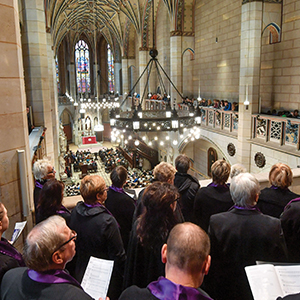The celebrations that opened the 500th Anniversary Year of the Reformation began appropriately in Wittenberg, where Martin Luther is said to have nailed his 95 Theses against the selling of indulgences to the door of the Castle Church on 31 October 1517. The act is commonly viewed as the trigger for the Reformation.
On Sunday 30 October, 500 balloons were released into the sky from the market square in Wittenberg and, together with representatives from the Protestant and Catholic communities, the mayor planted a tree in the Luther Garden.
Churches from all over the world and all denominations are being invited to sponsor one of 500 trees, and to plant a corresponding tree in a place that is significant for their own Church. The garden is a reminder of Luther’s alleged words, “Even if I knew that the world were to collapse tomorrow, I would still plant my apple tree today.”
A festive ecumenical service was held at 3 p.m. on Monday at the Protestant Marienkirche in Berlin organised by the leader of the German Protestant Churches, Bishop Heinrich Bedford-Strohm, and the German Protestant Churches’ ambassador for the Reformation anniversary, Margot Kässmann. Berlin Archbishop, Heiner Koch, Greek Orthodox Metropolitan Augoustinos and German President Joachim Gauck, who is a former Lutheran pastor, all attended. Cardinal Karl Lehmann, the former Catholic Bishop of Mainz, was awarded the Martin Luther Medal at the service for his “unique contribution to ecumenism in Germany”.
Already in the last week of October, clergy from 14 Churches – Catholic, Protestant, Syrian Orthodox, Anglican, Baptist and Methodist – gathered for a five-day ecumenical celebration at Augsburg where the Joint Declaration on the Doctrine of Justification was signed by the Catholic Church and the Lutheran World Federation in 1999. Twenty-five bishops declared their solidarity with the further steps that had been taken towards Christian unity. “We have not let go of the hands we shook [in 1999] and many new pairs of hands have joined us since then,” they declared.
However, in an interview with the German daily Die Tagespost published on 31 October, the Lutheran Bishop of Lund, Johan Tyrberg, who joined Pope Francis in a special prayer gathering in Lund on Monday, said he believed it would not be possible for the Christian Churches to become one Church. “We can nevertheless recognise and respect one another as Christian Churches,” he stated. Catholics had great problems with practices in Lutheran Churches such as women’s ordination (introduced in the Swedish Lutheran Church in 1958) and blessing same-sex unions, and Lutherans struggled with Catholic tenets such as papal primacy, he said.
03 November 2016, The Tablet
Reformation anniversary push for unity
 Loading ...
Loading ...
Get Instant Access
Subscribe to The Tablet for just £7.99
Subscribe today to take advantage of our introductory offers and enjoy 30 days' access for just £7.99



